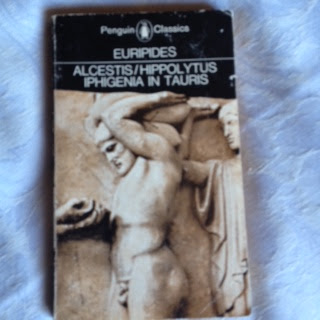Euripides, Alcestis / Hippolytus / Iphigenia in Tauris (trans. Philip Vellacott), (Penguin: Harmondsworth, 1974)
When I was a young undergraduate and studying classics, I remember thinking that ancient Greek plays should ideally be read in summer on a beach somewhere. The culture that produced them, after all, was addicted to life, to sunlight, and to personal wholeness. Reading this selection of Euripides’ plays I’m even more persuaded that this is the case.The theme that seems to link these plays is the theme of personal strength. That is, the strength that comes with self-mastery. The collection begins with Alcestis. The play begins on the day on which Alcestis, wife of Admetus, is to die. She had previously agreed to meet death to save the life of her husband. Admetus is inconsolable and refuses to set any bounds to his grief (p.71) despite the chorus offering a rebuke (p.55):
Her death, Admetus, is a blow which you must bear.
You are not the first of mortal men – no, nor the last –
To lose a noble-hearted wife. Consider this:
Death is a debt which every one of us must pay
The day is saved (somewhat improbably) by the arrival of Heracles en route to one of his labours. Heracles – physically powerful, unsophisticated and earthy – treats the matter simply as a problem to be solved (p.70):
The woman’s newly dead; and I
Must save her, and pay my debt of kindness to Admetus,
Setting Alcestis safe again in her own home.
The black robed king of the dead will come to drink the blood
Of Victims offered at her tomb. I’ll go there, hide,
And watch for him, and so leap out and spring on him,
And once I have my arms locked round his writhing ribs,
There is no power that can release him, till he yields
Alcestis to me. And if I miss my prey this time,
If death does not go to the bait of blood, I’ll go
Down to the sunless palace of Persephone
And Pluto, and I’ll ask for her. And, by my soul,
I’ll bring Alcestis up again, and deliver her
Into Admetus’ hands
This he does, leading to a mildly comic happy ending. The contrast the play stresses is between Admetus’ inability to master his own grief, and Heracles’ literally Death-defying confidence in his own strength.
Hippolytus covers another aspect of self-knowledge. The hero (if that is the word) in the title is a young man whose life is dedicated to honouring Artemis, virginal goddess of the hunt (pp.84-5). He shows little respect – even contempt – for Aphrodite, the goddess of love (in this case, sexual love): “My body is pure … I have no liking for a god worshipped at night” (p.86). Aphrodite, in revenge, causes his stepmother Phaedra to become infatuated with him. Phaedra’s secret is revealed to Hippolytus by a servant. He is incensed and excoriates them both (pp.102-3). Phaedra, in despair, hangs herself. She leaves a note accusing Hippolytus of raping her. This provokes Theseus (her husband) to curse him in a fit of rage, causing Hippolytus to be killed by a bull - that is, a breeding animal. The play ultimately works as a lesson on self-control, and the lack of it. Phaedra kills herself to break the grip of an uncontrollable passion. Hippolytus’ almost fanatical self-control makes it impossible for him to understand the pain his rejection and vituperation causes her. And Theseus’ loss of self-control leads him to kill his own son.
The collection ends with Iphigenia in Tauris, which shows us the end-stage of self-mastery. Iphigenia was the daughter of King Agamemnon. She was to be sacrificed by him to induce Artemis to allow his fleet to leave harbour and sail to the Trojan War. At the last moment, however, she was taken by Artemis to Tauris where she would serve as the goddess’ priestess, preparing foreigners as human sacrifices on the orders of King Thoas (pp.131-2). She pines to return to Greece and to see her brother Orestes again. Iphigenia and Orestes are descendants of Atreus and the nth generation of a family wrapped in a cycle of crime and revenge which has involved cannibalism, incest, curses and more homicides than a season of Midsomer Murders. Orestes arrives in Tauris, having recently murdered their mother Clytemnestra. He and Iphigenia recognise each other before he is to be sacrificed. Through a ruse they escape from Tauris with a sacred statue of Artemis, which Orestes has been tasked with stealing in recompense for the murder of Clytemnestra.
The setting in Tauris and the escape seem to be included for the sake of dramatic completeness. What is more interesting is the decision of the key participants to renounce vengeance. Iphigenia helps Orestes to steal the statue (and so free himself of bloodguiltiness for the murder of his mother) when it is within her power to kill him. She also renounces vengeance of Agamemnon and his posterity for attempting to sacrifice her (p.161):
now my wish is matched with yours – first, to releaseThis action ceases the long cycle of violence and ends the curse in which “anger grimly returns, cunningly haunting the house, avenging the death of a child, never forgetting its due” (Aeschylus, Agamemnon (trans. Louis McNiece)). The end of the curse is made possible by Iphigenia’s innate self-control which allows her to renounce vengeance.
You from your torments; next, renouncing bitterness
Against the hand that offered me in sacrifice,
To restore the shattered fortunes of my father’s house.
So my hand would be guiltless of your blood, and we
Could all be saved.
The modern West lives a long way from faith. Scanning the death notices of most newspapers shows recollections of times spent together and a vague notion that people will ‘meet again’ someday. Our world may be one from which gods have either been banished or upon which they have given up in disgust. If the heavens are no longer able to suggest how a person can honourably live their life, then Euripides would be a good place to start seeking a replacement.















